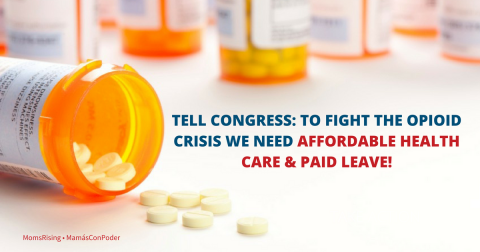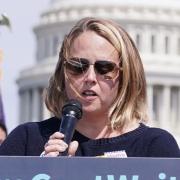
Fight the opioid crisis -> Tell Congress to protect Medicaid and support paid family & medical leave
I’m from wild and wonderful West Virginia. It’s a state known for its rugged, natural beauty. Unfortunately, it’s also known for being one of the states hardest hit by the opioid crisis.
I know that solving the opioid crisis is not an easy fix. I also know that right now there are two things currently being talked about on Capitol Hill that would go a long ways toward helping families dealing with opioid and other addictions (either personally or in their families). Those two things are access to affordable health care—including Medicaid—and access to paid family and medical leave.
Families must be able to get the care they need for themselves or loved ones without losing much-needed income or their livelihood.
Of course, West Virginia isn’t the only state facing a crisis. The truth is that life threatening drug use and dependence is happening in all communities. But it has disproportionately crippling effects on low-income communities and communities of color because of lack of access to care and treatment and higher risk factors.
---> And, here is an important sidebar: Contrary to mythology in the United States, African Americans do not use or sell drugs at a higher rate than Whites, however, Black communities have been disproportionately affected and torn apart by the criminalization of drugs and subsequent health crisis.
Many people dealing with their personal addiction to opioids or other substances need time away from work to seek care. This time includes doctor’s visits, rehab, medical care and more.
Family members of people with addictions ALSO need time away from work to provide the supports needed for successful treatment.
For example, at MomsRising we’ve heard stories about grandparents who are still in the workforce and need time away from work to help care for their grandchildren while their adult children seek help dealing with their addictions. Our members have also shared that they’ve needed to take time away from work to be with a family member who has been hospitalized due to overdoses.
That lack of access to paid family and medical leave is very hard on both someone seeking care for themselves or needing to care for others. It forces people to choose between a paycheck or helping themselves or their family members.
Family caregivers are hit by a double whammy. They often contribute financially to a family member’s recovery from substance abuse. And on top of that, they may end up losing pay if they need to take time away from work to help their loved ones. This loss of income can have a devastating impact on a family’s economic security.
Access to affordable health insurance and Medicaid are essential tools for families struggling with addictions. Hundreds of thousands of people suffering from addiction have gained coverage through the Affordable Care Act’s Medicaid expansion. In fact, the expansion reduced the unmet need for substance use treatment by 18.3 percent.
Affordable health insurance and Medicaid, combined with access to paid family and medical leave insurance can help save lives and keep families in the jobs they need while also boosting our economy.
That’s what we call a WIN-WIN-WIN.
http://action.momsrising.org/sign/paidleave_opioids/
***And be sure to share the link above with your friends and family so they can take action too!
Care is care is care. Being there for family is what matters. You shouldn’t have to give up a paycheck to be there for family and health care should be a right for all, not a privilege for only the wealthy few who can afford it.
Together we’re a powerful force for women and families.
P.S. Do you have an experience needing time away from and/or Medicaid to help a loved one or yourself deal with opioid or other substance abuse issues? Your voice on this important topic really matters! The opioid crisis and substance abuse, in general, are top of mind right now for a lot of people in Washington, DC. They may have a lot of numbers and research, but they also need to hear the stories of real people and what real people need right now. Share your experience here: http://action.momsrising.org/survey/substanceabuse_paidleave_medicaid/
P.P.S. We want to thank our friends at the National Partnership for Women & Families for their help with this post.



The views and opinions expressed in this post are those of the author(s) and do not necessarily reflect those of MomsRising.org.
MomsRising.org strongly encourages our readers to post comments in response to blog posts. We value diversity of opinions and perspectives. Our goals for this space are to be educational, thought-provoking, and respectful. So we actively moderate comments and we reserve the right to edit or remove comments that undermine these goals. Thanks!